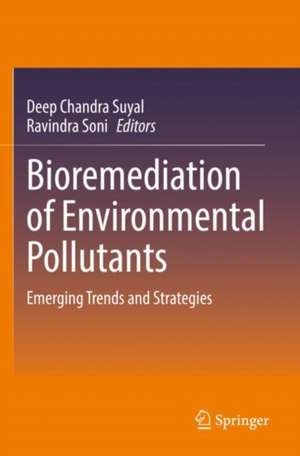Bioremediation of Environmental Pollutants: Emerging Trends and Strategies
Editat de Deep Chandra Suyal, Ravindra Sonien Limba Engleză Paperback – 13 dec 2022
Divided into 18 chapters, the book summarizes basic concepts of waste management and bioremediation, describes advancements of the existing technologies, and highlights the role of modern instrumentation and analytical methods, for environmental clean-up and sustainability.
The chapters cover topics such as the role of microbial fuel cells in waste management, microbial biosensors for real-time monitoring of bioremediation processes, genetically modified microorganisms for bioremediation, application of immobilized enzyme reactors, spectroscopic techniques, and in-silico approaches in bioremediation monitoring and assessment.
The book will be advantageous not only to researchers and scholars interested in bioremediation and sustainability but also to professionals and policymakers.
| Toate formatele și edițiile | Preț | Express |
|---|---|---|
| Paperback (1) | 1113.09 lei 6-8 săpt. | |
| Springer International Publishing – 13 dec 2022 | 1113.09 lei 6-8 săpt. | |
| Hardback (1) | 1119.24 lei 6-8 săpt. | |
| Springer International Publishing – 12 dec 2021 | 1119.24 lei 6-8 săpt. |
Preț: 1113.09 lei
Preț vechi: 1357.43 lei
-18% Nou
Puncte Express: 1670
Preț estimativ în valută:
213.02€ • 221.57$ • 175.86£
213.02€ • 221.57$ • 175.86£
Carte tipărită la comandă
Livrare economică 15-29 aprilie
Preluare comenzi: 021 569.72.76
Specificații
ISBN-13: 9783030861711
ISBN-10: 3030861716
Pagini: 396
Ilustrații: VIII, 396 p. 41 illus., 40 illus. in color.
Dimensiuni: 155 x 235 mm
Greutate: 0.57 kg
Ediția:1st ed. 2022
Editura: Springer International Publishing
Colecția Springer
Locul publicării:Cham, Switzerland
ISBN-10: 3030861716
Pagini: 396
Ilustrații: VIII, 396 p. 41 illus., 40 illus. in color.
Dimensiuni: 155 x 235 mm
Greutate: 0.57 kg
Ediția:1st ed. 2022
Editura: Springer International Publishing
Colecția Springer
Locul publicării:Cham, Switzerland
Cuprins
Waste Management: Challenges and Opportunities.- Microbes Assisted Bioremediation: A Green Technology to Remediate Pollutants.- Microbial fuel cells for wastewater treatment.- Critical process parameters and their optimization strategies for enhanced bioremediation.- Microbial Biosensors for Real-Time Monitoring of The Bioremediation Processes.- Recent Advancements in Mycoremediation.- Genetically modified organisms for bioremediation: current research and advancements.- Understanding the Role of Genetic and Protein Networking Involved in microbial Bioremediation.- In silico approaches in bioremediation research and advancements.- Modern landfilling approaches for waste disposal and management.- Aerobic Granular Technology: Current Perspective & Developments.- Recent perspectives of immobilized enzyme reactors used for wastewater treatment.- Role of Chelating Compounds in biodegradation and Bioremediation.- Spectroscopy and its Advancements for Environmental Sustainability.- Roleof Biochar in wastewater treatment and sustainability.- Bio-inoculants for Biodegradation and Bioconversion of Agrowaste: Status and Prospects.- Biochemical parameters and their optimization strategies for microbial bioremediation of wastewater.-Advanced molecular technologies for environmental restoration and sustainability.
Notă biografică
Deep Chandra Suyal is an Assistant Professor in the Department of Microbiology, from the Eternal University (India). He has been actively engaged in research for 10 years and has experience in the fields of environmental microbiology, agricultural microbiology, molecular biology, and biotechnology. He has authored several research articles and chapters in peer-reviewed international journals and books. He has co-edited the book Microbiological Advancements for Higher Altitude Agro-Ecosystems & Sustainability, published by Springer.
Ravindra Soni is an Assistant Professor at the Department of Agricultural Microbiology, I.G.K.V. (India). He has 11+ years of teaching and research experience in the field of environmental and agricultural microbiology, microbial ecology, microbial genomics, molecular biology, and biotechnology,A with a special focus on higher altitudes. He has authored several research articles and chapters in peer-reviewed international journals and books. He has also co-edited the book Microbiological Advancements for Higher Altitude Agro-Ecosystems & Sustainability, published by Springer.
Ravindra Soni is an Assistant Professor at the Department of Agricultural Microbiology, I.G.K.V. (India). He has 11+ years of teaching and research experience in the field of environmental and agricultural microbiology, microbial ecology, microbial genomics, molecular biology, and biotechnology,A with a special focus on higher altitudes. He has authored several research articles and chapters in peer-reviewed international journals and books. He has also co-edited the book Microbiological Advancements for Higher Altitude Agro-Ecosystems & Sustainability, published by Springer.
Textul de pe ultima copertă
This book collates the latest trends and technological advancements in bioremediation, especially for its monitoring and assessment.
Divided into 18 chapters, the book summarizes basic concepts of waste management and bioremediation, describes advancements of the existing technologies, and highlights the role of modern instrumentation and analytical methods, for environmental clean-up and sustainability.
The chapters cover topics such as the role of microbial fuel cells in waste management, microbial biosensors for real-time monitoring of bioremediation processes, genetically modified microorganisms for bioremediation, application of immobilized enzyme reactors, spectroscopic techniques, and in-silico approaches in bioremediation monitoring and assessment.
The book will be advantageous not only to researchers and scholars interested in bioremediation and sustainability but also to professionals and policymakers.
Divided into 18 chapters, the book summarizes basic concepts of waste management and bioremediation, describes advancements of the existing technologies, and highlights the role of modern instrumentation and analytical methods, for environmental clean-up and sustainability.
The chapters cover topics such as the role of microbial fuel cells in waste management, microbial biosensors for real-time monitoring of bioremediation processes, genetically modified microorganisms for bioremediation, application of immobilized enzyme reactors, spectroscopic techniques, and in-silico approaches in bioremediation monitoring and assessment.
The book will be advantageous not only to researchers and scholars interested in bioremediation and sustainability but also to professionals and policymakers.
Caracteristici
Covers the latest trends in bioremediation Outlines emerging techniques to monitor bioremediation Richly illustrated to enhance understanding of the instrumentation and processes
